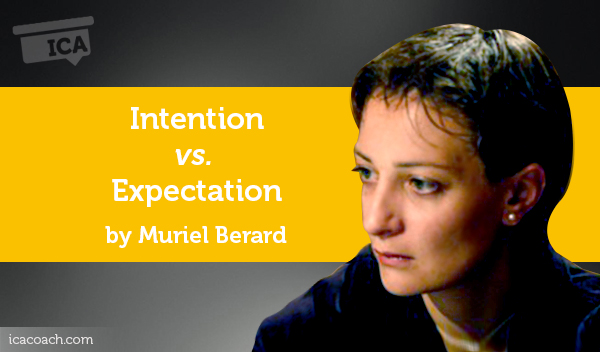A Coaching Power Tool created by Muriel Berard
(Life transition Coach, CHINA)
Reading
The difference between intention and expectation might sound subtle, but doing with an intention or doing in setting expectations can make a huge difference in our experience.
The Visual Thesaurus gives us a glimpse of the differences these two words carry. On first consideration, the difference between “Expectation” and “intention” seems like the difference between a passive and active approach to manifestation.
Let’s look at a very common example.
You take your car to attend an appointment.
Your intention is to find a place to park near to your appointment place. You know that leaving late from your place; you can’t expect to easily find a place to park.
Anyway, because your intention is to find a place, you will be looking and if, by any chance, when you arrive in the street of your appointment, you see a vacant place, you will feel very happy and satisfied. If you don’t find any, you will just look to another solution, which is to park few blocks away in an underground parking.
During this experience, your mind is focused on open solutions “and learning “next time I need to leave early in case I don’t find a place in the street”.
At the opposite, you leave late from your place because your expectation is to find a car place easily, as you usually do. If you find a place, like anticipated, OK, everything will go smoothly but you will not be particularly satisfied, just fine.
But, if you don’t, you will feel very frustrated and some how not ready to think of alternative solutions and look at a plan B.
The issue with frustration even anger is that it will mobilize your energy and your emotional reaction to the situation and might damage your logical thinking to find a solution!
If our expectation of results is zero, even the slightest achievement or fulfilment will result in infinite happiness or satisfaction!
H (Happiness) = A (Achievement) / E (Expectations)
- Expectation(s)
is defined in Oxford dictionary as a strong belief that something will happen or be the case; or a belief that someone will or should achieve something.
An expectation has a success or failure attached to it depending upon whether that expectation is realised.
When expecting something, we set ourselves up for an argument with reality. When expecting something, we have already created a narrative about the result: "how it's going to go", or “how it should/must/have to be” and consciously or not, we are expecting that story to unfold.
It is important to be clear about the meaning of the word “expectation”. It doesn’t mean intention to achieve or to have motivation, ambition, objectives or goals. It refers only to expectation of results, expectation of outcome.
Results depend on several factors, both internal and external, over which we cannot expect to have full control.
There is an uncertainty involved in the actual achievement of results despite our best intentions and efforts.
Therefore to be attached to the results while making the effort to achieve them, can cause unnecessary degree of anxiety, tension and fear of not achieving the results – a fear of “losing”.
An alternative to be living in expectations would be to live with intention. We can have an intention to achieve, and make the necessary efforts, without being worried about the fact that the result may not ultimately be achieved.
In this case, the attention and the psychic investment is not in the actual realisation of the results but in making the required efforts to achieve the results without expectations on what the results should be.
- An Intention
by definition is something that we want and plan to do.
Intention comes to modern English/American from latin “intendere”; meaning, “to give consideration, turn to or focus one’s attention, to have a plan, to think, conjecture or propose”.
So, if we set our intention toward a goal, aim or purpose, while being detached from the outcome, we can pay full attention to our efforts, to the process or the journey, which can lead to the results/outcome.
When we intend something, and are open to the actual (and possibly different) outcome, there is an opportunity to learn, stay curious and be with a new perhaps better outcome.
It will free ourselves from the fear “of loosing”, it will allow us to focus on the present and enjoy the process.
Setting an intention and let go of any attachment to a specific outcome, allow to control where we put our energy and cultivate a mindfulness of our efforts.
To summarise, an intention is simply an impulse, which gives structure and direction to creative energy. Expectation is a hope that something will happen. It comes from an ego state that is identified or attached to the outcome.
Case study
Laura had the objective to lose weight. She has set quantifiable measures of success: losing 20 pounds, fitting size M trousers and running and 8-minute mile. She expected to reach her goals within 6 months.
She has been trying hard for the last 3 months, controlling her diet and exercising 3 times per week without reaching the results expected half-way. Laura started to be discouraged and frustrated, telling herself that she will never make it.
She finally decided to get support from a coach.
